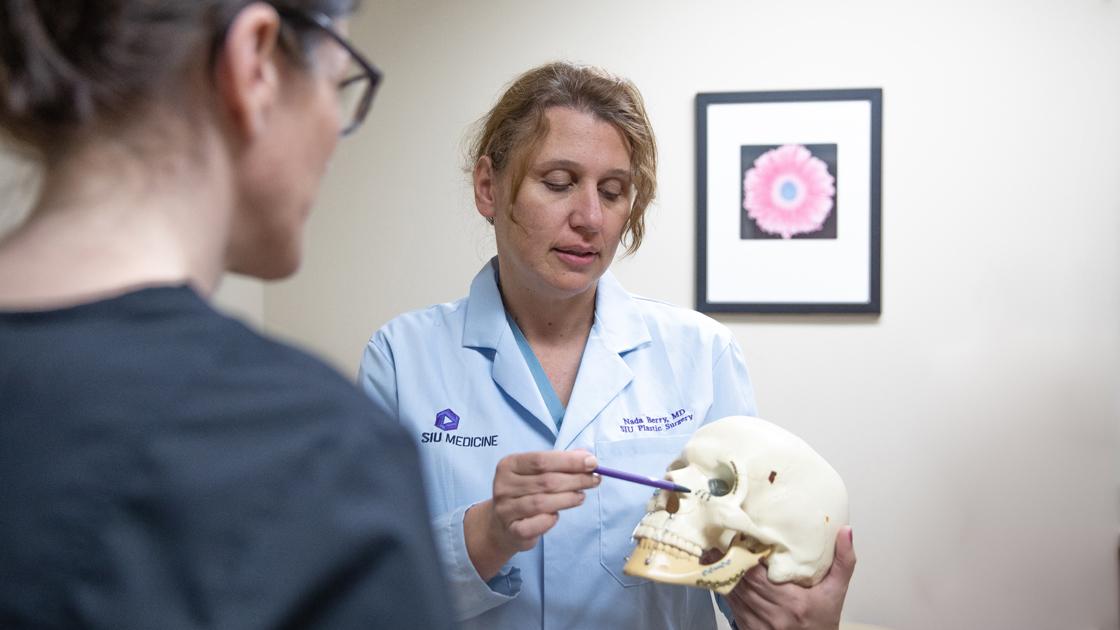
Important facts about facial fractures
Pop quiz: Do you know how many bones you have in your face?
14!
Breaking one of these bones can be a traumatic and life changing. Seeking medical care after any trauma to the face is important to avoid serious complications like a compromised airway or irreversible eye damage. But even after the emergent situation is over and recovery begins, a facial fracture can lead to significant changes in the appearance or function of your face. This can be both physically and emotionally challenging for you and your loved ones.
SIU Medicine’s dedicated team of surgeons works closely with people with facial fractures to help them recover with the best result. Read on to learn how facial fractures happen and what can be done about them.
Common causes and symptoms
According to data from the Global Burden of Disease Study, facial fractures happen all over the world and are more common in certain age groups (e.g., between ages 2 and 20 and older than 70). Common causes of facial fractures include:
- Falls
- Motor vehicle accidents
- Assault and physical violence
- Sports-related injuries
The only way to know for sure whether a bone in your face is fractured is by seeking professional medical care. Doctors use physical exams and imaging studies like CT scans to confirm which bones are broken. Experiencing any of the following signs and symptoms after facial trauma may indicate a facial facture and should prompt a visit to the emergency room:
- Pain and swelling
- Bruising
- Headache
- Tingling or numbness in the face
- Changes in facial shape
- Inability to breathe through your nose
- Changes in vision, specifically double vision
- Pain when you move the eyes, or inability to move the eyes normally
- Eyes that appear sunken or not in a normal position
- Inability to open and close your mouth
- Misalignment of teeth
Possible complications
Facial fractures can be a sign of additional injury, including traumatic brain injury or neck injury. If not properly treated, serious complications can occur. Untreated facial fractures can lead to infected bone, malalignment of bone, permanent visual disturbances and difficulty breathing or chewing.
Trauma to the face may also lead to damage to the nerves and tissues of the face, leading to issues like numbness, facial muscle spasms or droopy lips or eyelids.
Lastly, facial fractures can lead to scars and deformities that change the way a person looks.
Preventing and caring for facial fractures
Surgeons are highly trained physicians who can provide immediate and subsequent care for people suffering from facial fractures. They help restore symmetry, sensation and proper function of your face through a range of surgical techniques.
In addition to working closely with your medical team, here are a few other things you should do if you're recovering from a facial fracture:
- Avoid putting pressure on your face (e.g., sleep on your back, not your side or stomach)
- Use ice and pain medications as directed
- Keep your head elevated to decrease swelling
- If it’s a nasal fracture, avoid blowing your nose early in your recovery
Did you or someone you know suffer an injury that led to a facial fracture? Contact the experienced team of SIU Medicine surgeons in the Departments of Surgery or Otolaryngology Head & Neck Surgery (ENT) to schedule a consultation. We're here to help you regain your health and confidence using state-of-the-art technology, advanced skills and compassionate support throughout your recovery process.




